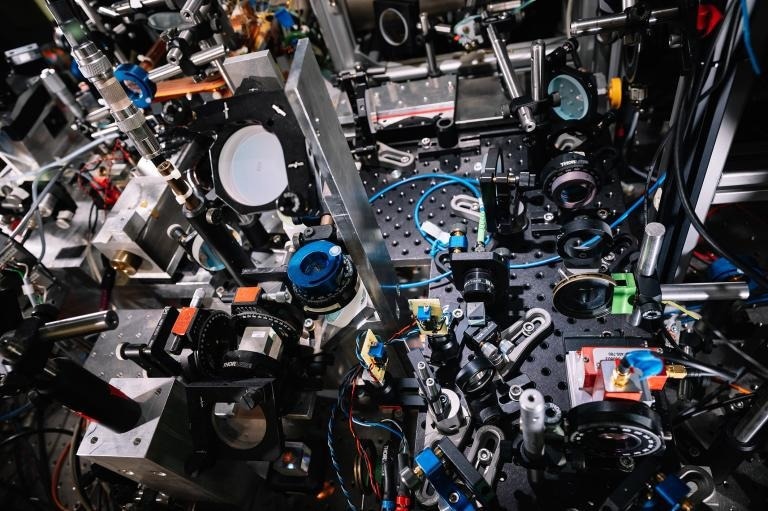Reviewed by Emily Henderson, B.Sc.Nov 9 2022
In ultracold atomic clouds, two superfluids can exist simultaneously. Their coexistence could not be experimentally investigated until now. Nevertheless, physicists from Heidelberg University have illustrated such a magnetic quantum fluid in an atomic gas, which is fluid in both ways.
 Experimental setup for demonstrating the coexistence of superfluids in ultracold atomic clouds in the “Synthetic Quantum Systems” research group. Image Credit: Florian Freundt (Heidelberg)
Experimental setup for demonstrating the coexistence of superfluids in ultracold atomic clouds in the “Synthetic Quantum Systems” research group. Image Credit: Florian Freundt (Heidelberg)
Researchers led by Prof. Dr. Markus Oberthaler were successful in preparing and characterizing this state in clouds of ultracold rubidium atoms. Their findings were published in the journal Nature Physics.
Fluids, as we know them, do not flow freely. Large pumps and turbines are required to move water, and honey flows slowly off a spoon. This is due to the fluid’s internal friction, which converts motional energy into heat. This can be drastically different in a quantum fluid, which is closely related to the phenomenon of Bose-Einstein condensation.
A Bose-Einstein condensate (BEC) is a very cold quantum mechanical state of atomic gas. A cloud of individual atoms behaves as a single fluid in this state. This quantum fluid is superfluid, which means it can flow without resistance.
According to Prof. Oberthaler, atomic Bose-Einstein condensates have been formed in recent decades from a wide range of atoms, including sodium, rubidium, and, more recently, erbium and dysprosium.
However, the majority of these atoms have internal degrees of freedom, meaning they have a spin and act like small magnets.
This can, in theory, lead to the phenomenon of Bose-Einstein condensation, but this has yet to be experimentally observed, according to Markus Oberthaler, a researcher at the Kirchhoff Institute for Physics. With an ultracold cloud of rubidium atoms, this demonstration is now possible.
Evaporative cooling is commonly used to prepare a Bose-Einstein condensate. This works similarly to blowing on a cup of coffee to cool it. The fastest atoms at the coffee’s surface are blown away, and the remaining atoms rest at a cooler temperature. Since this is extremely difficult for spin, Heidelberg physicists chose another method.
We initialized the system far from equilibrium and waited until the rubidium atoms reached a new state of equilibrium. What at first seemed less intuitive turned out to be extremely efficient.
Dr. Maximilian Prüfer, Study Lead Author, Vienna University of Technology
The researchers used specially developed detection and perturbation methods to create and trace this state. They discovered that the motional degree of freedom and the spin had become superfluid. Magnetic quantum fluids can become extremely fluid in two ways as a result.
Our new research methods allow us not only to characterize the condensate but will also allow us to better understand the path from non-equilibrium to that state.
Markus Oberthaler, Head, Synthetic Quantum Systems Research Group, Heidelberg University
The experimental physicists worked with Prof. Dr. Jürgen Berges’ research group at the Institute for Theoretical Physics to calculate theoretical predictions for the experimental observables. An extremely cold temperature had to be assumed to achieve agreement between the calculations and the experiment results.
The study authors added, “That surprised us all and will be the topic of further investigations for independent verification.”
The research was carried out as part of Heidelberg University’s Collaborative Research Centre 1225, “Isolated Quantum Systems and Universality in Extreme Conditions” (ISOQUANT).
Journal Reference:
Prüfer, M., et al. (2022) Condensation and thermalization of an easy-plane ferromagnet in a spinor Bose gas. Nature Physics. doi:10.1038/s41567-022-01779-6.